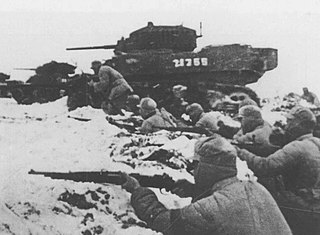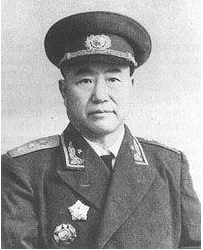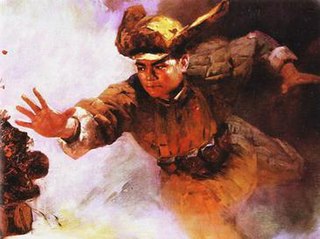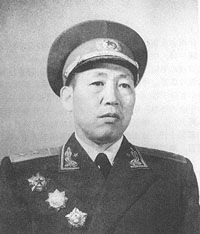
Peng Dehuai was a prominent Chinese Communist military leader, who served as China's Defense Minister from 1954 to 1959. Peng was born into a poor peasant family, and received several years of primary education before his family's poverty forced him to suspend his education at the age of ten, and to work for several years as a manual laborer. When he was sixteen, Peng became a professional soldier. Over the next ten years Peng served in the armies of several Hunan-based warlord armies, raising himself from the rank of private second class to major. In 1926, Peng's forces joined the Kuomintang, and Peng was first introduced to communism. Peng participated in the Northern Expedition, and supported Wang Jingwei's attempt to form a left-leaning Kuomintang government based in Wuhan. After Wang was defeated, Peng briefly rejoined Chiang Kai-shek's forces before joining the Communist Party of China, allying himself with Mao Zedong and Zhu De.

Lei Feng was allegedly a soldier in the People's Liberation Army who was the object of several major propaganda campaigns in China. The most well-known of these campaigns in 1963 promoted the slogan, "Follow the examples of Comrade Lei Feng." Lei was portrayed as a model citizen, and the masses were encouraged to emulate his selflessness, modesty, and devotion to Mao Zedong. After Mao's death, state media continued to promote Lei Feng as a model of earnestness and service, and his image still appears in popular forms such as on T-shirts and memorabilia.

The Nanchang Uprising was the first major Nationalist Party of China–Communist Party of China engagement of the Chinese Civil War, begun by the Chinese Communists to counter the Shanghai massacre of 1927 by the Kuomintang.

Su Yu, Courtesy name Yu (裕) was a Chinese military commander, general of the People's Liberation Army. He was considered by Mao Zedong to be among the best commanders of the PLA, only next to Peng Dehuai, Lin Biao and Liu Bocheng. Su Yu fought in the Second Sino-Japanese War and in the Chinese Civil War. He commanded the East China Field Army during the Chinese Civil War. One of his most notable accomplishments was the capture of Shanghai.

The Huaihai campaign, or Battle of Hsupeng, was one of the military conflicts in the late stage of the Chinese Civil War between the Kuomintang and the Communist Party of China. The campaign started when the People's Liberation Army (PLA) launched a major offensive against the Kuomintang headquarters in Xuzhou on 6 November 1948, and ended on 10 January 1949 when the PLA reached the north of the Yangtze.

First Sergeant Maximo Yabes born in Lodi, California, was a United States Army soldier who posthumously received the Medal of Honor — the United States' highest military decoration — for his actions near Phu Hoa Dong in South Vietnam during the Vietnam War. Yabes distinguished himself when he used his body as a shield to protect others in a bunker, moved two wounded men to a safer position where they could be given medical treatment and destroyed an enemy machine gun position before being mortally wounded.
Taking Tiger Mountain by Strategy is a Peking opera play and one of the eight model plays allowed during the Chinese Cultural Revolution. The plot is based on parts of the popular novel Tracks in the Snowy Forest by Qu Bo, which in turn, is based on the real-life story of an incident in 1946 during the communist campaign to suppress bandits in northeast China in the Chinese Civil War, involving a PLA reconnaissance soldier Yang Zirong (杨子荣) who disguised himself as a bandit to infiltrate a local gang of bandits, eventually helping the main communist force destroy the bandits. Unlike other characters depicted in the opera and novel, most of the names of both the protagonists and the bandits are real.

Zhang Side was a Chinese Communist soldier killed during the Second Sino-Japanese War.

Assembly is a 2007 Chinese war film written by Liu Heng and directed by Feng Xiaogang. It starred Zhang Hanyu, Deng Chao, Yuan Wenkang, Tang Yan, Wang Baoqiang, Liao Fan, Hu Jun, Ren Quan and Li Naiwen. The film, ostensibly portraying an anti-war theme, was first released on 20 December 2007. It won the 2008 Hundred Flowers Awards and the 2009 Golden Rooster Awards for Best Film.

Dong Qiwu was a general in the People's Liberation Army of China.
Dong Guishan is a retired lieutenant general in the People's Liberation Army (PLA) of the People's Republic of China, who served as commander of the PLA Tibet Military District.
Dong Xuesheng is a Chinese footballer who currently plays for Wuhan Zall in the Chinese Super League.
The Meritorious Service Medal is the third highest military decoration awarded by the Chinese government.
The Battle of Chatkol was the name given to the series of skirmishes between United Nations Command (UN) and Chinese People's Volunteer Army (PVA) forces near the village of Chatkol at the centre of the Iron Triangle during the Korean War. The position was held by the Belgian UN contingent for 55 consecutive nights, during which time they came under heavy attack.
Dong Hengyi, formerly known as Dong Chunyu, is a Chinese footballer who plays as a left-footed goalkeeper for Wuhan Zall in the Chinese Super League.

Huang Jiguang was a highly-decorated Chinese soldier during the Korean War.

The Hongjian-12 is a third generation, man-portable, fire-and-forget infrared homing anti-tank missile of China. It was unveiled at the Eurosatory 2014 exhibition.
Dong Hongyun is a former Chinese politician from Shanxi province. He was investigated by the Communist Party of China's anti-graft agency in December 2014. Previously he served as the Communist Party Secretary of Xinzhou and before that, mayor of Lüliang.
The 143rd Division was created in November 1948 under the Regulation of the Redesignations of All Organizations and Units of the Army, issued by Central Military Commission on November 1, 1948, basing on the 32nd Division, 11th Column of the PLA Dongbei Field Army. Its origin can be traced to 5th Independent Brigade of Jicha Military Region, formed in September 1945.

Wang Bingzhang was a Chinese Communist revolutionary and a founding lieutenant general of the People's Liberation Army (PLA). He joined the Northwest Army of the warlord Feng Yuxiang in 1929, before participating in the Ningdu uprising and defecting to the Communist Red Army in 1931. He fought in the Red Army's Long March, the Second Sino-Japanese War where he was credited with devising a trench warfare tactic that helped destroy enemy pillboxes, and the Chinese Civil War.












